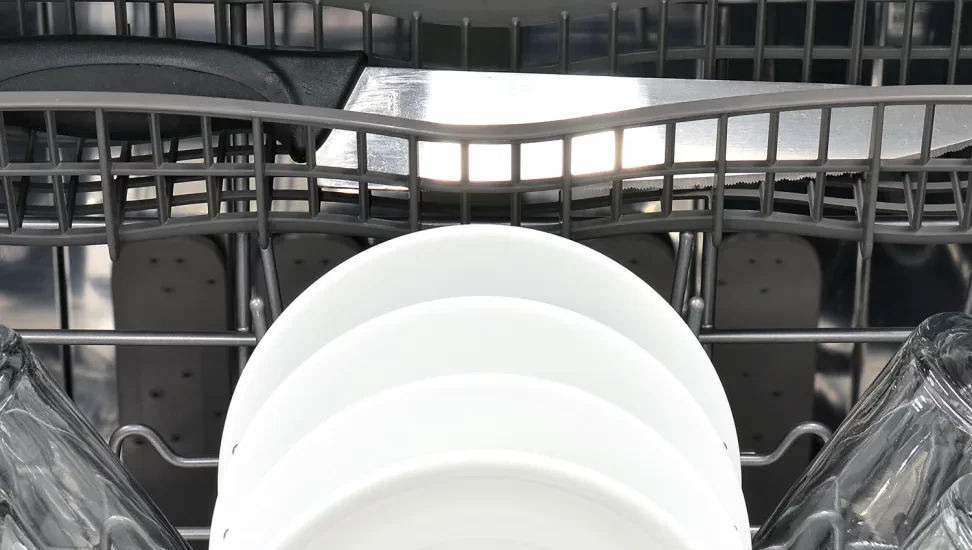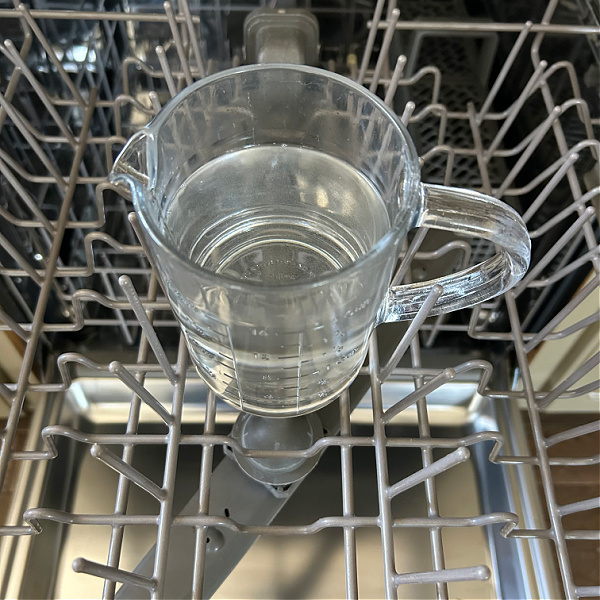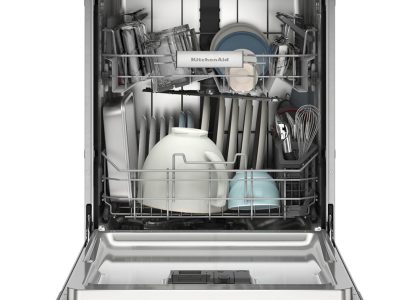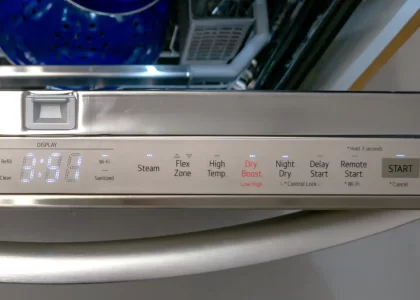Identifying the Source of Dishwasher Odors
When your dishwasher starts to emit a bad smell, it’s essential to pinpoint where it’s coming from. Unpleasant odors often mean there’s a problem that needs fixing. How to make dishwasher smell better? To do this, start by inspecting various parts of the dishwasher for tell-tale signs of food debris, mold, or grease build-up. The main culprits for dishwasher odors usually include:
- The Drain Filter: This plays a crucial role in trapping food particles, which can rot and cause odors if not cleaned regularly.
- Spray Arms: Clogged spray arms can harbor food particles and reduce your dishwasher’s effectiveness, leading to a build-up of residue and odors.
- Interior Surfaces: Grease and food can stick to the walls, racks, and door seals, accumulating over time and causing a smell.
- The Drain Hose: Blockages or kinks in the drain hose can result in standing water which can become smelly.
It’s not just about a one-time clean; regular maintenance is key to keeping odors at bay. By consistently checking these areas, you can often stop odors before they start. Remember that everything from the filter to the seals can harbor smelly residue, so give them all some attention. If you notice any mold, that should be addressed immediately as it can cause persistent smells that are more difficult to eliminate.
Step-by-Step: Cleaning the Drain Filter
How to make dishwasher smell better? Removing and cleaning your dishwasher’s drain filter is a key step in making your dishwasher smell better. Here’s a simple guide to getting it done:
- Turn Off the Dishwasher: Ensure it’s completely off before you start any maintenance.
- Locate and Remove the Filter: It’s typically found at the bottom of the dishwasher. It may twist off or have clips.
- Rinse the Filter: Use warm water. For stubborn gunk, add a bit of soap.
- Scrub Gently: Employ a soft brush or toothbrush to reach nooks and crannies.
- Inspect the Drain: Look inside the dishwasher for debris. Remove any you find.
- Reinstall the Filter: Make sure it’s securely back in place, locked if necessary.
Do this at least once a month to maintain a fresh-smelling dishwasher. It takes just minutes but makes a big difference.
A Deep Clean for Spray Arms
To clean your dishwasher’s spray arms effectively, follow these practical steps. Remove the spray arms from your dishwasher first. To do so, extract the bottom rack to easily reach them. Most models have an upper and a lower spray arm. Either unclip or twist them off their brackets.
Next, hold the spray arms under running water in your kitchen sink. Use warm water to rinse them thoroughly. Employ a toothbrush or a soft brush to clear out debris or mineral deposits from the nozzles. This ensures water flows evenly during dishwasher operation.
After cleaning the spray arms, check the mounting brackets for any buildup. Clean these areas if needed. If your model has a non-removable upper spray arm, wipe it with a damp cloth or sponge. Pay close attention to the nozzles for clogs or buildup.
Once cleaned, reattach all spray arms firmly. Ensure they are securely in place. Additionally, running a short dishwasher cycle will help verify that water is distributing properly. This process also confirms that the spray arms are functioning as intended.
Making a habit of cleaning your spray arms every two to three months can prevent food particles from hindering their efficiency. If you use your dishwasher frequently, or if visible residues persist, consider cleaning them more often.
Wiping Down Interior Walls, Racks, and Seals
While cleaning the drain filter and spray arms is crucial, don’t overlook the interior walls, racks, and door seals. Over time, these areas can gather grime and old food, causing bad smells. Here’s how to tackle these trouble spots effectively:
- Remove the Racks: Take out the bottom and the top racks to access the dishwasher’s interior easily.
- Mix a Cleaning Solution: Combine warm water and a mild dish soap to create your cleaning mixture.
- Wipe Down Surfaces: Dip a soft cloth or sponge into the solution and gently scrub the interior walls, door seals, and racks.
- Focus on Seals: Pay special attention to door seals where residue often hides. Use a toothbrush for tight crevices.
- Rinse off Soap: After scrubbing, rinse the area with clean water to avoid soap build-up.
- Dry Interiors: Use a clean, dry cloth to prevent any moisture from lingering, which could lead to mold growth.
Regular wiping of these areas—about every two to three weeks—keeps your dishwasher smelling fresh and optimizes its performance.
Deodorizing Techniques with Vinegar and Baking Soda
Vinegar and baking soda are powerful, natural deodorizers that can help rid your dishwasher of unwanted smells. Here’s a simple way to use these household staples:
- Using Vinegar: Start with an empty dishwasher. Place a bowl filled with one cup of white vinegar on the top rack. Run a hot water cycle. The vinegar will dislodge smell-causing residues. After the cycle, remove the bowl.
- Follow Up with Baking Soda: After using vinegar, sprinkle a cup of baking soda across the bottom of the dishwasher. Run a short hot cycle. Baking soda neutralizes lingering odors and provides a freshness boost.
Together, vinegar and baking soda not only cleanse but also deodorize your dishwasher, leaving it smelling fresh. Repeat this routine monthly or as needed to maintain a clean-smelling dishwasher.
Troubleshooting Persistent Smells: Inspecting the Drain Hose
If your dishwasher still smells after cleaning, check the drain hose. This hose can cause odors if it’s clogged or bent. Follow these steps to inspect and fix issues with the drain hose:
- Locate the Drain Hose: Find where the hose connects to the dishwasher and sink. It’s usually under the sink.
- Check for Kinks and Clogs: Make sure the hose isn’t twisted or pinched, as this can block water flow.
- Inspect for Blockages: Disconnect the hose and look inside for any trapped food or debris. Clear any blockages you find.
- Ensure Proper Installation: The hose should have a high loop to prevent sink water from backing into the dishwasher. If not, adjust the hose to form a loop.
- Run a Test Cycle: After making adjustments, run a quick cycle to see if the smell persists.
Regular checks of the drain hose can prevent bad smells and keep your dishwasher running smoothly.
Regular Dishwasher Maintenance to Prevent Odors
Keeping your dishwasher clean and odor-free involves timely and consistent maintenance. Here are some straightforward steps that will help ensure your dishwasher remains fresh-smelling and efficient.
- Clean the Drain Filter Regularly: The drain filter catches food particles, which, if left unattended, can start to decompose and cause odors. Clean this filter monthly to avoid any smell buildup.
- Inspect and Wash the Spray Arms: Food particles can clog the spray arms. Washing them every two to three months prevents this issue from impacting your dishwasher’s effectiveness and smell.
- Wipe Down Interior Surfaces: Soap film and food residue can stick to the washer’s interior surfaces, including seals and racks. Cleaning these areas every two weeks will help keep your dishwasher fresh.
- Use Vinegar and Baking Soda: These natural cleaners are great for maintenance washes. Run an empty wash cycle with vinegar monthly, followed by another cycle with baking soda to neutralize any lingering odors.
- Check and Clean the Drain Hose: Make sure the hose isn’t kinked or clogged. Regular checks will help ensure there are no blockages that might trap odors in the dishwasher.
By implementing these simple maintenance steps, you can significantly reduce the chances of your dishwasher developing persistent, unpleasant odors and ensure it runs efficiently.
Addressing Common Causes of Dishwasher Smells
How to make dishwasher smell better? Dishwasher odors often stem from a few common sources. Knowing these can guide effective cleaning and prevent future smells. Here are major reasons why your dishwasher might be smelling off:
- Food Particles Build-up: Small bits of food left on dishes can accumulate in the drain filter or crevices of your dishwasher. Over time, these remnants can decompose, leading to offensive odors.
- Grease and Oil: Fatty residues from your dishes can stick to dishwasher surfaces and, if not cleaned properly, start to smell.
- Mold and Mildew: The moist environment inside dishwashers is ideal for mold and mildew growth, particularly around seals and in corners where moisture can gather.
- Trapped Debris in Spray Arms: If the spray arms are clogged with debris, they not only perform poorly but can also contribute to unpleasant smells.
- Blocked Drain Hose: A clogged or kinked drain hose restricts water flow, potentially leading to water build-up that becomes stagnant and smelly.
By routinely checking each of these components and keeping them clean, you can greatly minimize the chances of your dishwasher developing lingering odors. Regular maintenance not only helps make your appliance smell better but also enhances its overall performance and longevity.








